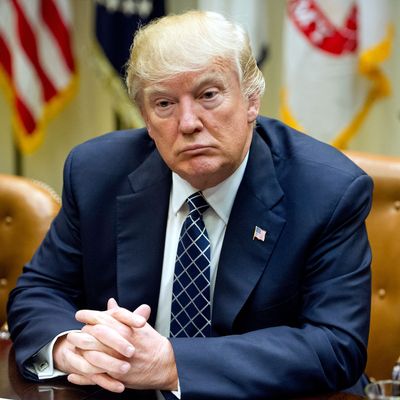
On the campaign trail, Donald Trump vowed to “rip up” the North American Free Trade Agreement. Now, he appears content to make a few tears around its edges.
A draft proposal of the White House’s goals for renegotiating the agreement, obtained by The Wall Street Journal, would leave many of its most controversial elements in place. While Trump as a candidate decried the threat that “international bankers” pose to American sovereignty, his proposal would retain NAFTA’s Investor State Dispute Settlement process — an arbitration system that allows international investors to sue countries (often, for passing laws that disadvantage their business interests) before private tribunals whose rulings cannot be appealed.
The proposal would also do nothing to address “currency manipulation” by America’s trade partners, another concern that figured prominently in Trump’s stump speeches.
Ironically, many of the draft’s proposed changes would make NAFTA more closely resemble the Trans-Pacific Partnership, the 12-nation trade agreement among Pacific Rim countries that Trump withdrew the United States from, shortly after taking office. Such reforms include heightened enforcement of intellectual property rights, protections of digital trade, and requirements that state-owned firms operate in a commercial fashion.
That said, the administration’s plan is not devoid of protectionist measures in keeping with Trump’s “America First” ethos. But it’s difficult to assess how much of an impact such provisions would have, as the draft’s language is decidedly vague. Here are three of its most potentially significant proposals:
(1) Empower NAFTA nations to reinstate tariffs in the event that they are being flooded with imports that cause “serious injury or threat of serious injury” to their domestic industries. According to the Journal, the Clinton administration sought a similar provision 24 years ago, which was shot down by Mexico.
(2) Revise the rules of origin — requirements that a certain percentage of a product must be made from materials produced in NAFTA countries — in a manner that “supports production and jobs in the United States.”
(3) Establish “rules that require government procurement to be conducted in a manner that is consistent with U.S. law and the administration’s policy on domestic procurement preferences.” Right now, NAFTA requires the U.S. government to consider bids from Mexican and Canadian companies on infrastructure products. The Trump administration seems to be asking to flout this rule and give its contracts exclusively to American companies. This would, ostensibly, cost U.S. contractors some business in Mexico and Canada.
If one posits the most extreme interpretation of these proposals, they could signify a major shift in American trade policy. But it also seems reasonable to interpret their conspicuous lack of detail as a sign that the administration is looking to maximize its wiggle room in negotiations.






























